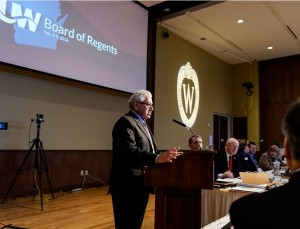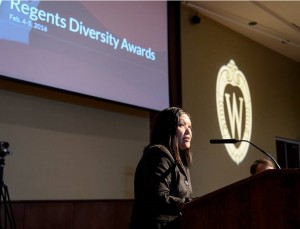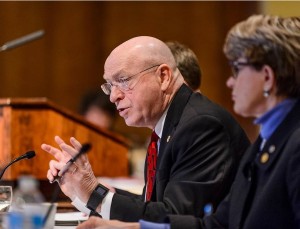MADISON, Wis. – The University of Wisconsin System Board of Regents’ Education Committee voted unanimously on Friday to recommend adoption of three new or revised Regent Policy Documents that continue tenure and lay out new processes for faculty layoffs or termination.
“These policies were drafted with three goals in mind: to reaffirm this board’s and the System’s commitment to strong tenure and academic freedom; to increase our accountability to students and taxpayers of the state; and to ensure our state has comparable tenure policy that allows us to continue to be in the global education marketplace,” said Regent Vice-President John Behling, who chaired the UW System Tenure Policy Task Force.
“These policies will help us demonstrate accountability which is what the public wants to see from the System,” Behling added. “Without that demonstration of accountability, whether real or perceived, our budget prospects in future years will not improve.”
The policy documents recommended for approval included: (1) revisions to the existing faculty tenure policy; (2) revisions to the policy on periodic post-tenure review in support of tenured faculty development; and (3) a new policy relating to financial emergency or program discontinuance requiring faculty layoff and termination.
Only the Education Committee members voted on the resolutions to be forwarded, although all Regents were invited to participate in the committee meeting. The recommended policy documents will now come before the full Board for a vote in March.
Board recognizes winners of Regent Diversity Awards
The Regents honored the eighth annual winners of its Regents Diversity Awards. The awards were established by the Board to recognize and support individuals and programs in the UW System that foster access and success in university life for historically underrepresented populations.
Regent José Vásquez, chair of the selection committee, said the people and programs honored reflect a clear understanding of what is needed and, more than that, do something about meeting those needs. “Each of our award winners here today shows a genuine respect for human differences, a deep attentiveness to the learning process, and a keen responsiveness to students and their educational needs,” Vásquez said.
- See the Jan. 27 UW System news release
This year’s Diversity Awards winners are:
Individual: Chia Youyee Vang, Associate Professor, History, UW-Milwaukee
Vang initiated and developed an innovative, interdisciplinary Hmong Diaspora certificate program that provides opportunities for students to learn about Hmong cultural history, language and heritage. She also assisted other faculty members to incorporate Hmong-related materials in their courses and mentors Southeast Asian students through rigorous undergraduate research projects.
“My ability to overcome obstacles along the way was clearly enabled by the relationships I had with teachers, administrators, and other mentors who helped to open doors to new opportunities. I strive to do the same for my students,” said Vang, whose family came to the United States as refugees in 1980. She said her commitment to building the capacity of the next generation of scholars has prompted her to intentionally involve students in research.
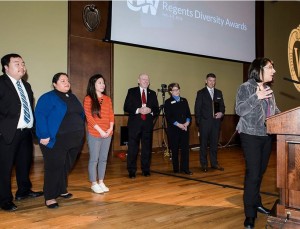
Members of UW-Stout’s Multicultural Student Services, with Program Director Barbara Miller at the podium. (Photo by Jeff Miller/UW-Madison)
Institution/Unit: Multicultural Student Services, UW-Stout
UW-Stout’s Multicultural Student Services, led by Barbara Miller, has achieved a strong record of reaching out to underrepresented minority students at UW-Stout, helping them to succeed by addressing their personal, academic, financial, cultural and career needs.
Miller pointed out that the Multicultural Student Services staff members were all once first-generation college students themselves. “We remember what it was like to sit in classrooms with little financial resources and low expectations, where much of our history, people and culture were excluded from or misrepresented in the curriculum,” she said. “Those barriers still are too common today.
“Because more Asian, black, native and Latino students graduate from UW-Stout than ever before, families and communities are changed through education,” Miller added. “Students too often denied, polarized or minimized for cultural differences can be empowered to access increased career and financial opportunities.”
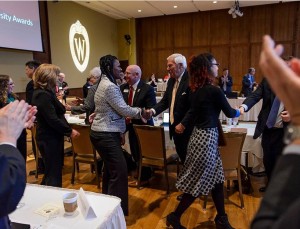
Members of UW-Extension’s and UW Colleges’ 4-H SySTEMatics program shake hands with the Regents. (Photo by Jeff Miller/UW-Madison)
Team: 4-H SySTEMatics Program, UW-Extension, with UW Colleges
The SySTEMatics program, created from an innovative partnership led by the Milwaukee County UW-Extension 4-H Youth Development team and working with UW-Waukesha Continuing Education, is designed to bring low-income 7th and 8th-grade students into the STEM fields (Science, Technology, Engineering and Math).
“Together we created a program that’s successful and affordable for a diverse group of students in the city of Milwaukee to foster excitement in learning STEM subjects and also have them excited about planning for their future,” said program coordinator Eva Terry. “It’s awesome seeing these students progress … and their confidence levels skyrocket in the program.”
Presidents’ Reports
As part of his regular update to the Board, President Cross reported on a recent meeting with students of color from several UW institutions as well as members of United Council.
“We talked about what the UW System has done to close achievement gaps between students of color and white students. We talked about our efforts to improve graduation rates for students of color. We have done a lot. Are we where we need to be? No. Have we hit all the benchmarks and goals we set in the past? No, we have not,” Cross said.
He continued: “It troubles me, and that’s why I’m glad all of us in the UW System continue to work on important, very tangible action items to ultimately improve the experiences of all students, staff and faculty members. Can we and should we do more? Yes, and I have asked the students to help us in that effort.”
- Link to President Cross’s full statement
Cross also reported that the UW System is working on forming and launching a UW System diversity council as well as hiring a new Special Assistant for Diversity and Inclusion, who will be charged with coordinating and monitoring internal activities to ensure the UW System and System administration are demonstrating results and improving outcomes.
Cross also moved to correct possible public misperceptions following the recent release of the UW System’s Annual Financial Report.
“I am disturbed that some recent headlines might lead you and the public to believe the UW System is in a better position financially than a year ago when, in fact, that’s not the case,” Cross said.
He said the reality is that the UW System’s overall net position with respect to unrestricted funds – those funds which the university can control in managing its institutions – decreased by nearly $115 million dollars between fiscal year 2014 and fiscal 2015. A new accounting rule that takes into account a large pension asset – which the System does not have access to – impacted the restricted net position by approximately $330 million, Cross said. Further, funds resulting from bond proceeds that are being held for approved UW System capital projects that have not yet been started, account for another approximately $78 million.
As part of his News from Around the UW System report, Cross noted that UW-Stout marked its 125th birthday last month and that UW-Platteville will be celebrating its 150th anniversary this year.
- See President Cross’ News from Around the UW System
Cross’ faculty spotlight, which is designed to help the public better understand what faculty members do, featured Tera Montgomery, an associate professor of dairy and animal science in UW-Platteville’s School of Agriculture.
“I have colleagues all over the System who teach, day in and day out. We have families, we interact with students. I am just one of many folks who do a lot of different things,” Montgomery said.
UW-Platteville Chancellor Dennis Shields noted that Montgomery “is remarkable, but she is also exemplar of the UW-Platteville faculty.”
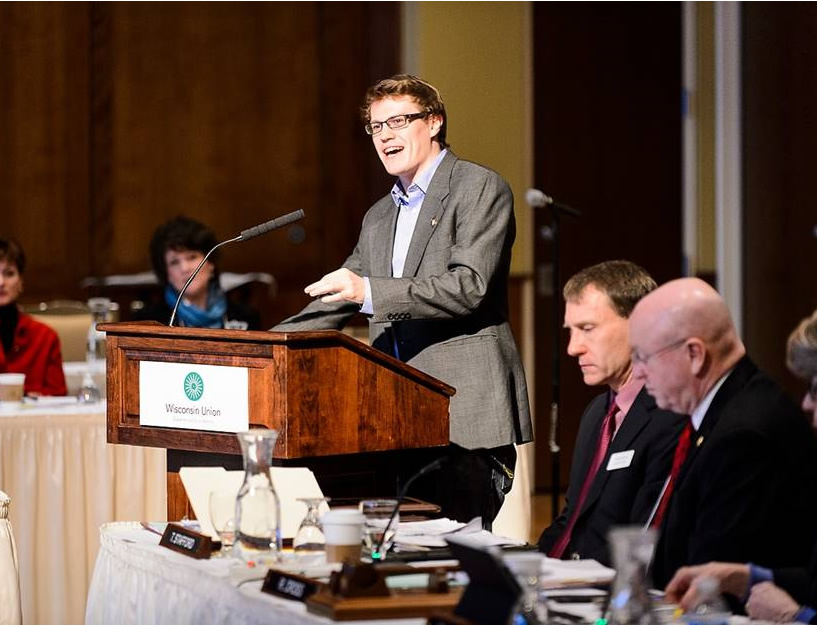
Colin Higgins, a UW-Madison graduate student and recent recipient of a Rhodes Scholarship, addresses the Board of Regents as part of President Cross’ Student Spotlight. (Photo by Jeff Miller/UW-Madison)
Colin Higgins, a graduate student in environmental policy at UW-Madison’s La Follette School of Public Affairs, was featured in President Cross’s Student Spotlight. Higgins is one of only 32 students nationwide to win a Rhodes Scholarship this academic year.
“One of the interesting things about environmental policy is that it’s never just about the environment. Environment is always entangled in society and social issues,” Higgins said, adding that “the world’s fight … is a fight for urban and rural environments that are more livable and accessible and allow people to feel fulfilled, stable and free.”
He also addressed what he called “unequal opportunity on campus.” “I wouldn’t be where I am today without public higher education, and for that I am grateful. I hope to see these opportunities and support available to all students,” Higgins said.
Regent President Regina Millner also provided an update on the progress of the System’s Tuition-Setting Policy Task Force. Reporting on its most recent meeting, which focused on the relationship between tuition, affordability, and financial aid, she noted the strong commitment of task force members, leaders and staff at all institutions to making a high quality UW education affordable for Wisconsin residents.
Millner also updated Regents on the ongoing process of making changes to the Wisconsin Administrative Code in order to comply with the regulatory amendments under the Violence Against Women Reauthorization Act and federal guidance issued by the U.S. Department of Education Office for Civil Rights related to Title IX.
In other action, the Board of Regents:
- Approved a resolution of appreciation for UW-Madison as host of the February 2016 meeting;
- Approved UW-Madison’s request for authority to construct the $6.7-million Near West Playfields Upgrade Project;
- Approved UW-Madison’s request for authority to: demolish the Seed Building, increase the Meat Science Laboratory project budget by $2.9 million Gift Funds; and construct the $45.7 million project;
- Approved UW System’s request for approval of eight All Agency Maintenance and Repair projects totaling approximately $9.1 million at six campuses: UW-Green Bay, UW-Madison, UW-Milwaukee, UW-River Falls, UW-Whitewater, and UW-Richland;
- Approved a new Regent policy on information technology security in the UW System, which will provide the framework for the development of a comprehensive UW System information security program;
- Approved UW-Madison’s Master Clinical Studies Agreement with AstraZeneca Pharmaceuticals LP;
- Approved UW-Madison’s Master Clinical Studies Agreement with Pharmatech, Inc.;
- Approved UW-Milwaukee’s request for three-year renewals of charter contracts for two existing UWM-chartered schools: Capitol West Academy and the School for Early Development and Achievement; and
- Approved UW-Milwaukee’s request for five-year charters for three new proposed Milwaukee charter schools: United Community Center Acosta Middle School, Penfield Montessori Academy, and Stellar Collegiate Charter School.
###
The next meeting of the University of Wisconsin System Board of Regents
will be on March 10, 2016, in Madison.
More photos from the Feb. 5 meeting

